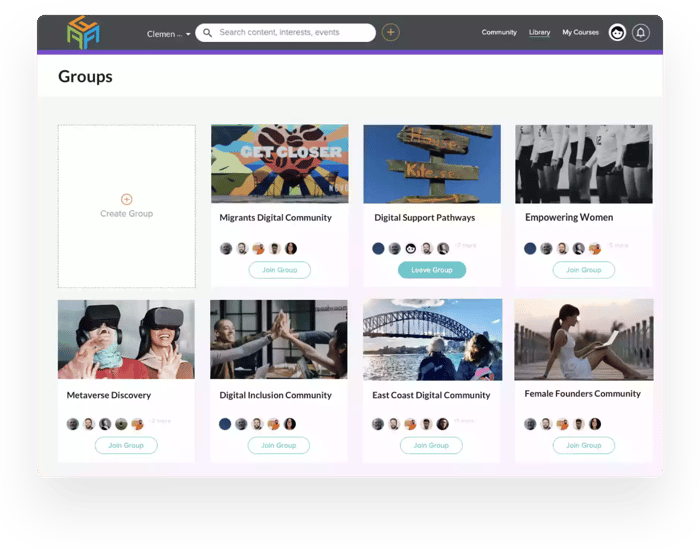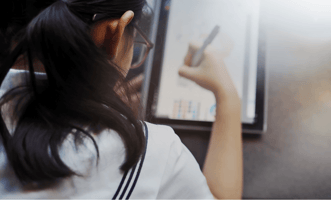Picture this. A budding entrepreneur has an idea to create a better and more functional computer...
Oppida interview with Jamie Engel on Neutopia
Last month, I sat down with Jamie Engel, the CEO and Founder of Neutopia. We connected on LinkedIn prior, and then once we got started talking we couldn’t stop! So much so, that the small interview turned into a large one. So, here it is: a collection of interesting perspectives and words of wisdom from Jamie about building a company to solve a digital learning problem.

What was the motivation and drive behind Neutopia?
Jamie launched his teaching career in about 2012 after having a strong background in Hollywood film, special effects, storytelling, and screenwriting. He ended up being asked if he wanted to be a teacher at the Billy Blue College of Design. Which Jamie though, “sounded like a crazy idea, so I said yes.”
However, he found it hard to share all the great stuff he was learning with his students through the existing platform he was given. “I kept thinking, ‘Gosh there has to be another way I can do this.’” So, he started to try and hack a solution to this sharing problem. Using Slack, FB, and any other collaboration tools he could find.
In his own words, Jamie “didn’t know anything about the academic world. I didn’t know the terminology surrounding elearning that was turning up around that time.”
“I just was going, ‘there’s all this great stuff I’m learning and I want to share with the students. But I don’t want to have discussions—I don’t really want to lecture as lectures can be boring for me as well as the students.’” Jamie really just wanted to get around a table with his students to discuss critical issues and projects through project-based learning and set his students’ tasks that gave them a sense of purpose.
“So anyway, I tried creating Facebook groups and I tried Slack chat groups. And it was all a struggle to work because as each term passed there would be great content from the term before that hadn’t been conserved or shared. Or the students wouldn’t be in the same group or it wasn’t very shareable or maybe students simply didn’t know what to search for. So I thought, “Okay maybe I’ll have a look around and see if there’s some other product that I could use, perhaps designed like Spotify, where people could follow each other.’”
The share, follow, and suggestion model of Spotify was a great inspiration for Jamie; “If there’s a student working on a project using 3D printing, doing all this research, and finding great Ted Talks, I’d love for a student in the next term—who is also doing 3D printing—to be able to follow the previous one and learn what they’re learning while they’re one term ahead.”
“Wouldn’t it be great if everyone could be sharing content and creating great focus around design, typography, graphic design, and UX design within this huge community where you could crowd-source content, share it with everybody, and make a playlist? Or why can’t the platform make suggestions too based on your likes and dislikes? ‘Hey! You typed: RFD 1970 style of retro graphic design. Here are some great talks, conferences that you should know about, and, oh, there’s an event coming up that you might like to go to.’”
He remembers looking and looking around for someone, anyone to make this learning platform, “And I thought, ‘Well I guess I have to do it. I guess I can’t just talk about it.’
So, at the same time as teaching others how to do it, Jamie was reading books on startups, minimum viable products, and user experience design and starting his own journey to building Neutopia from scratch.
How did Neutopia grow to the platform it is from your idea?
“So you know, I’ll be very honest. Since day one, I was fortunate enough to have Billy Blue College, Think Education and Laureate International University take part and pilot the platform. They got curious and offered to let me test it out in some of the classes…”
Jamie remembers feeling so embarrassed in the first few tests and massively understood the need for beta products. “Sweat is dripping off my brow and I was standing in front of the students before I realised I had two choices. I could be totally honest and share that I had no idea what I was doing and hope the product works or I could pretend I had it handled.”
Thankfully, everyone was really supportive around the inception of Neutopia and they seemed to quite enjoy testing it out. Everyone was happy to be involved in the process of improving it.
“I was super fortunate. And there’s nothing like having 20-30 students and teachers all beta testing your platform to help you identify what does and doesn’t work. The continuous feedback I was receiving was super helpful: the best thing that you can do in business is just to be in sync with your users. For Neutopia, starting and continuing to act on that feedback loop has helped with the engageability of the platform for the learners who are using it. Students even began asking if they could stay on the platform even after the term’s end.”
How do you think Neutopia has raised the bar in digital learning?
“Improving education or transforming education happens at multiple layers, and I think that’s what Neutopia can do as a platform.”
Jamie believes creating excellent learning experiences is all about answering the important questions, “How can we scale great learning? How can we save time for the teacher and for the students? And how can we automate curiosity, motivation, and connection in the learning community with social aspects? And I think the answer lies in digital learning programs.”
“If the program taps into the right online education algorithm; the teacher, the coach or the facilitator can enhance that to support extremely well-designed learning experiences. But creating an atmosphere to learn in is just as critical as what the platform can provide. And that atmosphere needs to be supported by the right teacher, coach or facilitator.”
“I believe a good teacher is like your personal trainer. ‘You tell me where you want to get to and then my job is to help you get there.’ So, if you want to get 6-pack for summer we’re going to have to work really hard and if you don’t do the work you’re not going to get there. That’s an important element of facilitation.”
“As for Neutopia, I think our willingness to treat the classroom and program design as a lean startup and iterate it, is a really great thing. Every term, I would survey the students to ask, ‘What do you like? What don’t you like or what did you find not great? And what’s the 1 or 2 things you would change to improve the course design?’ This way, the course constantly changes and grows. I think continually fine-tuning and improving is part of a great learning experience design.”
If you like this interview, don’t forget to read our other great discussion: Oppida & Cahoot Learning talk relationship based learning



